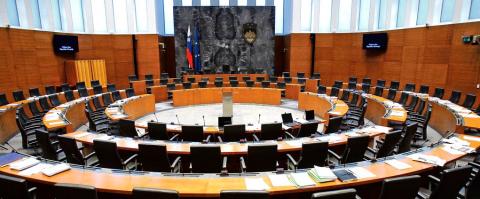Analyst sees parliament’s work hampered by balance of power

Ljubljana – The National Assembly’s failure to endorse the agenda of the plenary needed to go ahead with the session in the first such instance ever is yet another sign of how the current balance of power is hampering parliament’s work, at times making it impossible, an analyst has assessed for the STA.
Miro Haček, a professor at the Ljubljana Faculty of Social Sciences, notes that no side – the three government coalition parties and their non-coalition supporters on the one hand, and the centre-left opposition on the other – has an “a priori majority”, but has to make an effort to muster one each time.
In Haček’s estimates the opposition can reach up to 43 votes in the 90-strong legislature and the coalition up to 47, where the votes cannot be taken for granted at all. This makes parliament’s work hard in particular at times when too many MPs are absent on one or the other side.
This puts the legislature in a very difficult situation and if it was to last until the next regular election in about a year, it “would very much slow down the pace to adopt the substantive solutions the coalition has committed to”.
Such a situation gives the parties that support government projects, in this case the National Party (SNS) and the Pensioners’ Party (DeSUS), “much bigger power than they would get by proportion”, says Haček, adding that it is easy to benefit from such power.
One of those parties’ motives in supporting the government would certainly be that they want to ward off an early election where they are not expected to do well and which are also costly for small parties.
Slovenia is due to hold three sets of regular elections next year, the general election, local elections and presidential election.
Some MPs are not personally keen to end their term early. “This is not something new in Slovenia’s parliamentary history,” the analyst says, recalling how back in 2000 two MPs voted to appoint Andrej Bajuk prime minister in a third attempt with only six months to go until the next election.
Haček, a lecturer at the Chair of Policy Analysis and Public Administration, says he would personally make it impossible to defect from one deputy faction to another, even though he is aware this would be all but impossible to achieve as deputies are granted free mandates by the constitution.
However, he believes there would be fewer defections if the National Assembly amended the electoral law in such a way as to give voters more say in who gets elected. In that case it would be possible to hold MPs to account politically at least.
The role of the two MPs who represent the Italian and Hungarian minorities is thankless in the given situation, Haček says, as their primary role is to form solutions that affect their respective ethnic communities, while they are not supposed to tip the scales otherwise.
Now they are forced into a “peculiar role”, being pressured by the left and the right, which is bound to come to the fore in the vote on whether to dismiss Igor Zorčič as the parliamentary speaker after he defected from the coalition.
Haček does not find it surprising that the coalition has not placed the proposal to dismiss Zorčič on the agenda of an emergency session they are demanding in place of the regular one.
“We’re in a situation when every vote counts and two MPs are absent,” Haček. To his knowing DeSUS deputy group leader Franc Jurša will be absent for a few days from Thursday as Dušan Verbič, an MP for the coalition Modern Centre Party (SMC), is also absent, so he assumes the coalition will want to wait for them to return before calling a vote on the speaker.
Minority MPs have acted as king makers before; in 1996 when the right bloc had 45 seats and the left 43, Hungarian minority MP Maria Pozsonec and Italian minority MP Roberto Battelli sided with the left, while later MP Ciril Pucko defecting from the Christian Democrats to the Liberal Democrats paved the way for the appointment of Janez Drnovšek as prime minister, Haček noted.
The post Analyst sees parliament’s work hampered by balance of power appeared first on Slovenia Times.
- Log in to post comments










